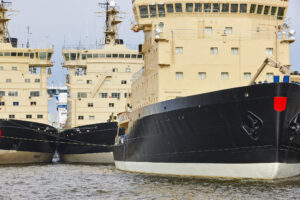German sea ports saw a decrease in the volume of goods loaded and unloaded. The decrease reached a 3.2% in 2022 in comparison with the previous year, while a total of 279.1 million tonnes of goods were loaded or unloaded. Sweden replaces Russia as Germany’s largest trading partner with a cargo handling volume of 24.4 million tonnes.
The German Federal Statistical Office (Destatis) reports that the volume of goods received from abroad (-1.5%) declined at a much slower rate than dispatches to foreign countries (-7.0%). The volume of goods loaded or unloaded in German sea ports fell by 4.9% in 2022 compared with the pre-crisis level of 2019 (293,5 million tonnes).
As Germany´s Destatis reveals in its analysis “the most important German seaport for cargo handling was Hamburg with a handling volume of 103.4 million tonnes (-7.2% compared to the previous year), followed by Bremerhaven (42.8 million tonnes, -8.7%), Wilhelmshaven (31.8 million tonnes, +7.6%), Rostock (21.3 million tonnes, -3.2%) and Lübeck (16.4 million tonnes, -6.9%).”
Sweden is the most important partner country with 24.4 million tonnes of goods handled followed by Norway (22.7 million tonnes), the United States (22.0 million tonnes) and China (20.9 million tonnes).
Russia, still the most important partner country in 2021, only ranked 7th among the most important partner countries in 2022 with 13.4 million tons of goods handled.
Maritime transport with China accounted for just over a fifth of German container throughput in 2022.
China once again proved the most important partner of the German seaports in container traffic. China accounted for over a fifth (21.5%) of German container throughput in 2022, followed by the United States with a share of just over a tenth (10.2%). Three Chinese ports were among the five most important foreign partner ports in container traffic in 2022. The most important partner port was Shanghai with 893,000 teus, followed by Singapore (576,000 teus), Ningbo (508,000 teus) and New York (403,000 teus) and Shenzhen (391,000 teu).
Furthermore the German seaports received a total of 36.1 million tons of coal, crude oil and natural gas in 2022, which was 13.9% more than in 2021.
In the research approach, ships with a tonnage of at least 100 gross tonnage are recorded. This does not include fishing vessels and fish processing vessels, drilling and exploration vessels, tugboats, push boats, dredgers, research/survey vessels, warships and vessels used exclusively for non-commercial purposes as well as for bunker, supply and repair voyages and the like. The data also for China do not include Taiwan and Hong Kong.



